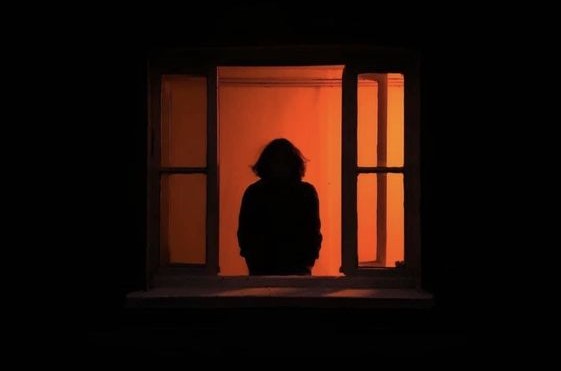No one is home. The ceiling fan still turns in the living room of this flat in western Kuala Lumpur, but otherwise nothing stirs. When Tatsuya Segawa gets back from the office tonight, he will once again find the place a shambles. Every toy Minoru owns, and every household item Aoi has pressed into service as a toy—from plastic kitchen utensils to empty biscuit tins—is strewn about the living room. The pandemonium that produced such disarray might easily be imagined, but for now the flat is silent.
Not far from the vestibule, near the toddler gate that protects Minoru and the kitchen from one another, tiny bits of crazily cut-up paper sit in piles on the floor. Near one pile are sewing scissors, near another, plastic children’s safety scissors—relics of one of Aoi’s desperate attempts to occupy the boy. In normal times, she would have guided their son to tidy up, but then, in normal times he’d have been expending his energies at playschool, not cooped up at home and losing his mind in frustration. Aoi also has lately feared going mad. Each day feels endless. Minoru alternates between hysteria and lethargy, and simply wants to watch Anpanman videos all day, though he’d be up hours past bedtime with surplus energy if she let him. He has screaming fits when she tries to rouse him from indolence to play a game, or to do anything physical, even if all she can think of is to cut up scrap paper.
Beyond the piles of paper, beyond the unholy mess of toys, the living room windows look down nineteen storeys onto the Taman Tun Dr Ismail neighbourhood. From outside waft motorcycle noises, a car alarm, a call to prayer over loudspeakers. The sky is a filmy malevolent grey, an afternoon sky like none Aoi ever saw till this year. She often sits frowning at this window during Minoru’s nap, glaring at the inexorable enemy beyond. The internet has not been helpful. Japanese-language information is contradictory on the Haze, on its effects and dangers, how long it will last, whether it will keep getting worse. That it mainly floats across from Indonesia is all she is sure of. It’s insane—it is an insane situation that the very air is unsafe to breathe. Fears play across her mind when she gazes out, then rewind and play again, trapping her in a chilling slow-motion moment without end. It is mid-September, but, a year into expat life near the equator, where there is no change of seasons to demarcate life, Aoi struggles to sense the passage of time.
By the windows stands a matt-black bookcase with a neat row on the third shelf: Flixotide inhalers, Ventolin inhalers, Avamys nasal spray. She saves the empties for reference. Behind these lurks a child-sized nebuliser mask brought home from the hospital. Also, a plastic drinking straw: Aoi tried breathing through it, imagining how Minoru’s attacks must feel. When they watch videos on the sofa, his head in her lap, her gaze often caresses the boy’s strong limbs, delicate mouth, quick eyes. Her imagination conjures visions of fearful innocence in those eyes as his airway constricts. Panic threatens to unhinge her. How many seconds of oxygen deprivation might it take to erase his existence? Erased and never restored. Terror seizes the very bones within her, crawls like spiders across her skin, makes her heart pound like a faltering lorry engine. To sequester the boy within their own home is the only escape. Or the only feasible escape.
Also on the shelf lies a card the hospital in Petaling Jaya gave her, though she doesn’t need it; it merely shows his blood type, which she already knows: B negative. Her own is B positive; Tatsuya’s, O negative. Her husband can give blood to their son, but she cannot. This bothers her.
A glass display case of anime figurines stands against the opposite wall of the living room. Aoi sees no real harm in this pastime of Tatsuya’s. Her husband was the victim of bad advice early in life, was convinced to put off his dream of breaking into the animation industry in order to follow a conventional career path. After reading archaeology in university—observing the peculiar Japanese custom of studying a thing one will not do for a living—he ended up in logistics, and works now for an exporter called Hishinuma Ltd. That he does very little in the office, shrewdly shunting tasks onto subordinates—that he is uncommitted to his own career, his motivation cankered by the resentment of knowing precisely what he’d rather do but being unable ever to do it—is a fact he hides not only from his superiors but even from his wife. He never discusses his old dream with her, nor does he give much overt attention to these rather pricey collectibles. Strangely, howsoever badly Aoi wants money now, it has not occurred to her to try selling them online. Her mind doesn’t work that way.
In the centre of the living room, midway between the bookcase and the figurines, is the off-white sofa that came with the furnished flat. Papers are strewn across it: payslips from Hishinuma. Aoi pulled them from a clear plastic file Tatsuya keeps in his desk in the spare room, her purpose to check whether hours of overtime worked are listed on the slips. They aren’t. The night before, she had quarrelled with Tatsuya over whether he ought to apply for back pay on overtime. To her, any potential to bring in a bit extra is worth exploring, given how adamant he is that her plan for taking Minoru away is simply too far beyond their means. Her persistence in asking about it gets up Tatsuya’s nose—does she have any idea how the company will see him if he’s the only one making overtime claims? Overseas posting or not, a Japanese company is a Japanese company. Another, deeper objection troubles him, one he baulks at acknowledging even to himself: that, though he does work long hours, he idles away so many of them that he feels no moral claim to extra wages. On the sofa, one of the payslips has also been chopped to ribbons with scissors—Aoi venting.
Before the sofa is a glass coffee table; on this, Aoi’s open laptop. One browser tab has a drafted but unsent email to her former boss at Nagoya Ramen. A request for a second chance. He’d been permitting her to work remotely, mostly doing payroll, to allow her to stay home with Minoru, but she missed a key deadline and he snippily informed her he’d take over from there. She’d been working without the proper visa and had no legal recourse or right to benefits, so that was that. She nearly blew up at Tatsuya after he consoled her by remarking they could get by on his salary alone. Quite a grand thing to say when he’d just got done lecturing her on how flight tickets to Tokyo were beyond their budget. Since then, she’s been sleeping in Minoru’s room.
Another browser tab is open to a Star Online news report on school closure; the air pollution index has exceeded two hundred. This number, she has told Tatsuya, is her hard limit: when the API hits Unhealthy, she is flying back to Japan with Minoru, where her mother has agreed they may put up in her flat. His response: ‘Maa, ki o tsuketara nantoka naru kedo.’ It’ll be fine as long as we’re careful. His way of saying no. How exactly does he expect her to ‘be careful’ when the bloody air is deadly? Is their son supposed to dodge particles of pollution like bullets from The Matrix? She needn’t say these things aloud for her husband to sense she’s thinking them. Tatsuya feels certain his wife is winding herself up beyond reason, and he puts it down to itchy feet, the tedium of forced idleness. If Hishinuma allowed working from home, he’d gladly take over the babysitting. The surreal, nearly apocalyptic view from their window affects him rather differently—it inspires a fey sense of freedom. When the world goes haywire, isn’t everything beyond his control? It wouldn’t be his fault if the Earth’s very atmosphere prevented him working. As for the air pollution index, the government will surely take steps before things get bad.
A third browser tab: a site for comparing fares from KLIA to Narita. Next to the laptop are an open notebook and a gel pen, though nothing is written on the page.
At the end of the room nearest the kitchen is the dinner table. On it lie a porcelain bowl of white rice, a wooden bowl of miso soup, a plate of salt-broiled fish, and a small dish of pickles. Each is covered in cling film with water droplets forming on the inner side. One pair of chopsticks. One empty glass. A can of Asahi sweating condensation. No note.





